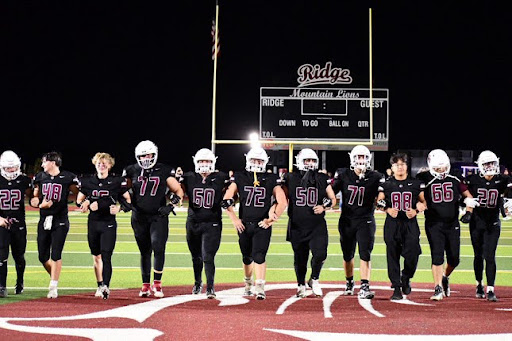Dual vs AP
February 8, 2022
Dual POV
Even though I was the kid when I was younger that thought they would take all APs throughout high school, I have only taken one AP class in my high school career, and I have no regrets.
I took my first AP class–World History–when I transferred to Ridge in my sophomore year, and wow, what a mistake that was. It was a fun class, I’ll admit; I was in an intellectually stimulating environment with people who had similar academic drive. The con, however, was that this was one of the first classes in which I did not pass all of my quizzes and DBQs with As.
Now, I know how that sounds. Oh wow, she didn’t get an A? Scandalous. Yeah, but if you’re like me and place your self-worth on academic validation, then you’ll understand the absolute panic I felt at not getting an A in the class. Luckily, COVID came and saved my grades because of all the extra credit opportunities we were given. They also shortened the AP test that year to accommodate for online testing–and thank god they did. I received a 3–which, out of 5, is barely passing.
I still received credit, but it wasn’t like said credit did anything. Because, in case you’re unfamiliar with the transferability of AP credit, some AP credits don’t transfer depending on your college of choice. If you don’t get a high enough score (typically below a 3), they don’t usually transfer, either.
This begs the question: why take AP in the first place? There is a real possibility that you won’t get credit for college, so the entire year is needless stress that you could have avoided.
After that first AP class, I never took one again. Granted, some of the classes I took had to be combined with AP classes because they had the same work but not enough interest or teachers for the classes to be separated. Still, even though I had the same workload, I didn’t have to take the AP test but I was in that academic-centric environment that I had wanted.
Now, you must be wondering: why would I pass up the opportunity to earn college credit? Even if there wasn’t a high probability that I would receive it, wouldn’t I at least want to try?
The answer is that there is another option that gives you credit just by taking the class: dual.
Dual enrollment is what I recommend to any high school student, but especially to incoming freshmen. Dual typically isn’t as stressful as AP because there is a lighter workload and your credit doesn’t depend on a singular test.
Now, if you hate school or just don’t want the extra work, you might be thinking that neither AP or dual are for you. However, dual makes it so that you have less school in the long-run.
For me, I took enough classes (with some additional online classes over the summer and during the school year through Rio) that I’ll have my Associates Degree by the time I graduate in May. That means that my college time will be cut in half–I’ll only have to go for 2 years instead of 4.
Also, dual classes save you and/or your family a lot of money in comparison to what you’d pay in a 4-year university. Now, you could do community college after high school, but that would only save you money and not time. And, like I said, if you hate school, you’ll probably want to be done with it as fast as possible while still obtaining a degree.
Furthermore, if you have a social life or are involved in any extracurricular activities like clubs or sports, APs are difficult to keep up with. Don’t get me wrong–a full schedule of APs look fantastic on your transcripts and you have a lot to boast about to your friends and family. Nevertheless, it’s important to note that you can still get into college without them.
So far, I’ve gotten into every college I’ve applied to, all without APs. This proves that you don’t need to burn yourself out by working 24/7 for four years of high school, the time in our lives where we should enjoy ourselves before reality sets in.
In the end, it’s your decision; you know yourself best. APs might be great for you, so take my advice with a grain of salt. Whatever you choose, just remember that it’s just high school and it’s not the end of the world if you choose one class over the other.
AP POV
I am a student who has only taken AP’s throughout my highschool career. This year I am enrolled in 3 and will take 3 final exams in the spring.
Last year I took one Advanced Placement course – World History. While the topic of the class wasn’t my favorite, I am so grateful I took the course as it prepared me for higher level learning this year. I studied hard for the final exam, received a 4 out of 5, and was comfortable with my tripled course load as a junior.
AP classes are also a cheaper option to earn college credit. Each exam costs $96 and guarantees credit for the majority of US colleges. Dual enrollment courses cost on average $250 per semester. Since MRHS only offers dual through Rio Salado community colleges, many universities outside of Arizona will not take the college credit. It is a personal decision to go to school in-state, but it should be known that dual credit is not as widely accepted as AP and you should keep your options open.
When you are applying to college, it is often mandatory to input your class rank. Many know that honors classes help boost your rank, but so do AP’s. Dual classes don’t: a B in a dual credit class counts as a B, but would count as an A in an Advanced course.
The status that comes with being an AP student has advantages despite the extreme course load. I am still able to have a social life, be involved in my church and student government, be the school newspaper’s co-editor in chief, and be on the school’s beach volleyball team. To be able to handle a couple of AP’s and a life outside of school looks great for universities. While it may be a lot in the moment, it prepares you for college and your overall future!
I really recommend enduring a heavier workload and taking that AP class! You should never limit your future self by taking a dual class that might not be accepted as college credit. Sure, it’ll be hard, but so many students have gone before you and persevered so you may too!
Conclusion
In summary, there is no right answer when it comes to choosing your courses. Dual typically comes with a more balanced lifestyle, while AP has a lot of academic benefits that look great for college applications. Whatever you decide, do what’s best for you.







